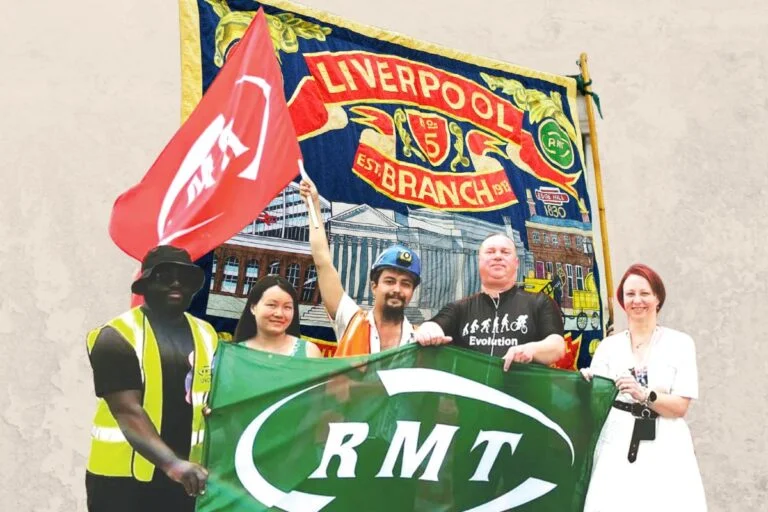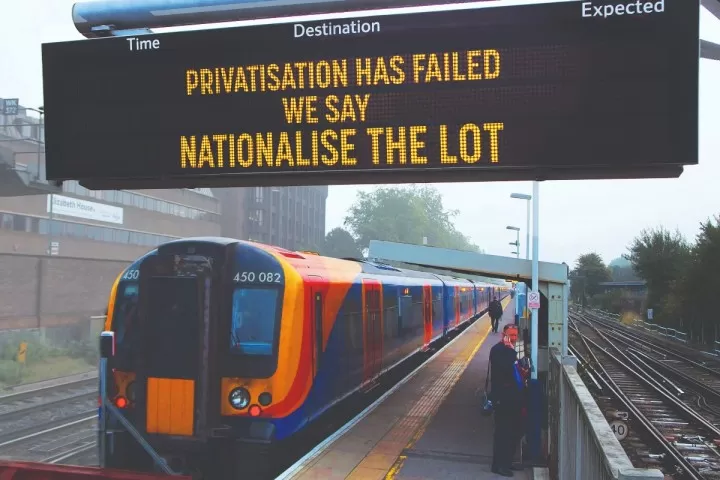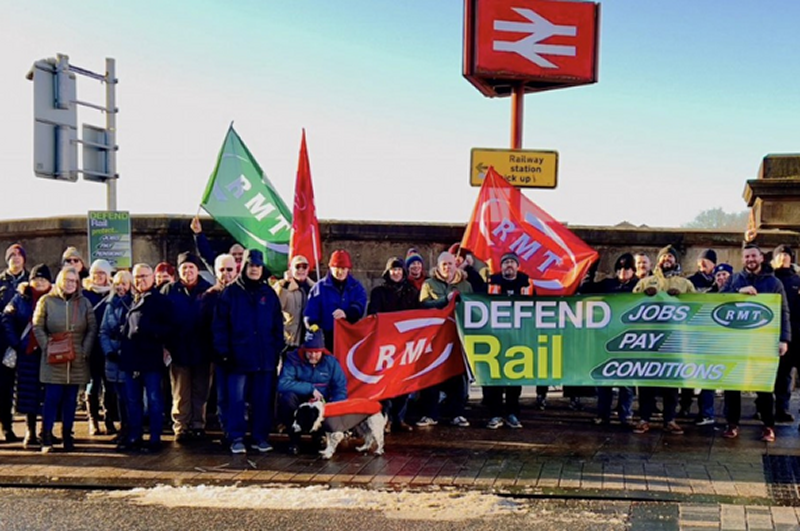In Britain, members of the National Union of Rail, Maritime and Transport Workers (RMT) at Network Rail – the body which runs most of Britain's railway network – have voted to accept an improved pay deal, secured thanks to months of determined strike action. But the threat of attacks on jobs and conditions still looms. Workers must remain vigilant and fight for nationalisation.
The deal represents a wage rise of 14.4% for the lowest-paid, down to 9.2% for higher grades. By contrast, at the start of the dispute, Network Rail were offering a 2-3% increase. At the same time, apprentices on minimum (poverty) wages will receive a boost of between 30-85%.
The agreed package also includes other extras, such as a retrospective increase in pay, backdated to January 2022, and a 75% leisure travel discount.
Significantly, the deal is also no longer conditional on the union accepting proposals for ‘modernising maintenance’: a package of cuts to jobs and conditions that would threaten the safety of passengers, staff, and the very future of Britain’s railways.
This victory is also a significant defeat for the Tory government, which has tied the hands of all 15 rail companies with a demand for cuts and wage restraint, while pushing for below-inflation pay deals across the public sector.
Inspiration and lessons
Other striking workers will no doubt be looking at the headline figures of the Network Rail deal, hoping to achieve the same or higher. This should inspire confidence in the wider movement to ramp up the pressure on the bosses and Tories.
Above all, this win was achieved thanks to the determination and courage of thousands of workers.
 Above all, this win was achieved thanks to the determination and courage of thousands of workers / Image: Socialist Appeal
Above all, this win was achieved thanks to the determination and courage of thousands of workers / Image: Socialist Appeal
This dispute therefore contains a number of positive lessons for the wider movement.
A strategy of coordinated action – across the railways and with other trade unions. Bold campaigns led by the leadership, and through the network of reps, to unite the ranks against previous offers. And militant, class-based language by our general secretary, Mick Lynch. All of these were key to the success of this struggle.
What next?
Nevertheless, unresolved questions remain, which cannot be glossed over.
The deal will allow members to regain strength after losing pay from strike days and overtime bans. It will partially alleviate the burden of rising prices. But as Lynch has pointed out, the pay rise will be spread over two years, and still remains below-inflation for the higher grades.
It is certainly true, as some members have emphasised, that the implementation of ‘modernising maintenance’ measures has stalled. But the threat of these attacks continues to loom.
The Office of Rail and Road (ORR) – the official regulator of Britain’s railways and highways – has stated that it “shares some of [the RMT’s] concerns” over the impact on safety of these proposals.
The RMT leadership, meanwhile, wants to challenge the plans legally. But the courts are not neutral. And neither is the ORR, which itself is tied to the government and to Network Rail.
Instead, we must rely on our own strength. Our greatest weapon is our unity and militancy. What verdict the courts and regulators pronounce depends, in the final analysis, on the power of our movement. It is through strike action, not legal avenues or appeals to watchdogs, that we will stop the bosses in their tracks.
In turn, the fight against ‘modernising maintenance’ should not be isolated from other disputes. On the contrary, our struggle must be linked up with that of other railway workers and strikers. Coordinated action would have a far greater impact than an isolated walkout by Network Rail maintenance workers.
In short, this struggle is not over. Workers must remain vigilant against any attempt by Network Rail bosses to bring in their cuts, incrementally, through the back door – as they have already done with changes to maintenance schedules, voluntary redundancies, and team restructures.
The next period must therefore be used to regroup, and to prepare the ranks of the RMT for a tooth-and-nail fight – through industrial action – to abolish and reverse these plans.
Workers’ control
Of course, workers do not want to be, and cannot be, on strike forever. This poses the question: What are we fighting for?
Under capitalism, the menace of inflation consistently erodes real wages. And Mick Lynch has already stated that further strikes could be on the cards in coming months, if prices, rents, and bills continue to soar.
While the bosses increase their profits at our expense, we would have to strike year after year just to stand still in terms of real-terms pay.
We should therefore fight for pay increases that are tied to inflation – i.e. a sliding scale of wages. Such demands have been won by unions in Spain, for example.
At the same time, the bosses will take advantage of every opportunity to implement their cuts, hurting workers, passengers, and the whole industry.
 The wealth that the workers produce must be also fully under the control of the working class, not syphoned off into the pockets of private contractors / Image: Socialist Appeal
The wealth that the workers produce must be also fully under the control of the working class, not syphoned off into the pockets of private contractors / Image: Socialist Appeal
Mick Lynch is right to say that the parts of ‘modernising Maintenance’ that have been imposed so far have “collapsed into chaos”. But this doesn’t mean that the bosses won’t try to carry out their attacks regardless. What it does demonstrate is that they have no idea what the actual conditions on the ground are.
This begs the question: Why should they call the shots when it comes to our jobs and conditions, or in any aspect of the work we do? These parasites need to be done away entirely, by bringing in democratic workers’ control.
Similarly, the wealth that we – the workers – produce must be also fully under the control of the working class, not syphoned off into the pockets of private contractors, train and freight operating companies, and rolling stock companies.
These leeches have been laughing all the way to the bank, whilst investing scarcely a penny into the actual modernising of the railway.
All these monopolies must be nationalised, without any compensation to their current fat-cat owners. Only then can we build a rail service that is effective, affordable, and safe for all.
We have won an important battle. But the class war continues.

